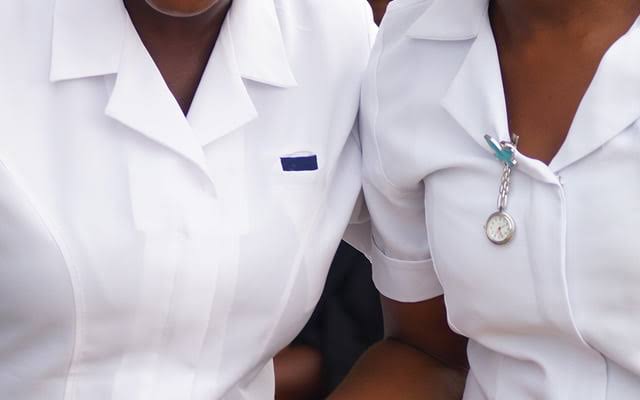The National Association of Nigerian Nurses and Midwives (NANNM), on Thursday, appealed to the Federal Government to accede to its demands to ensure improvement in healthcare delivery in the country.
The Secretary of the Lagos State Chapter of the association, Mr Oloruntoba Odumosu, made the appeal in an interview with NAN in Lagos State.
Recall that Nigerian nurses, under the aegis of NANNM, had embarked on a seven-day warning strike on July 30 to press home some demands.
The strike, which follows expiration of a 15-day ultimatum the association gave to the government, is coming amid a faceoff between doctors and the government over welfare and other issues.
Odumosu told NAN that the government was to hold a meeting with national leaders of the union on Thursday to dialogue to resolve the issues leading to the warning strike.
He said that the outcome of the meeting would guide the association’s next line of action.
“Because it is a national issue and a national strike, we are not engaging the Lagos State Government; we can only put pressure on the Federal Government to listen to us.
“These demands have been long overdue; some of them are things that are four decades old.
“Ordinarily, we should have lost patience a long time ago. This is the first time the association has gone on strike as NANNM in over two decades.
“Before we called for this strike, we had given the government an ultimatum which it failed to address; rather, it was addressing the Nigerian Medical Association (NMA) and meeting with the members,” he said.
He said that nurses were the largest professional group in the health sector, urging the government to meet the demands.
“We want to stop brain drain, but we can’t if the policies are not there to address our concerns.
“We appeal to the government to accede to our demands quickly so that we can end this needless suffering and loss of lives among patients,” he said.
According to him, monitoring teams are on ground in all Lagos primary, secondary and tertiary public hospitals to ensure full compliance with the industrial action.
The strike had paralysed healthcare services nationwide, leaving patients stranded and putting pressure on other health professionals.
The nurses’ demands include gazetting of the Nurses Scheme of Service approved by the National Council on Establishment in 2016, upward review of professional allowance for nurses and midwives, and
employment of more nurses.
The others include provision of adequate health facilities, creation of a department of nursing in the Federal Ministry of Health, and implementation of a National Industrial Court judgment of Jan. 27, 2012.
The NMA has also given the Federal Government a 21-day ultimatum to meet its demands or face an indefinite nationwide strike by medical doctors.
Nurses’ strike: Kebbi NANNM chair apologises, urges action
Meanwhile, Kilani AbdulWaliyu, Chairman of NANNM in Kebbi State, has apologised to Nigerians over the ongoing nationwide warning strike by nurses.
He made the plea while addressing journalists in Birnin Kebbi on Thursday in response to the one-week industrial action.
“I want to use this medium to apologise to Nigerians, especially our patients. We understand the implications of withdrawing our services; we value lives. However, we are left with no option but to down tools,” he said.
“We are also feeling the pain of this decision. We are human, we respect human lives, and we know the possible consequences, including increased mortality. These are the difficult considerations we weigh before embarking on a strike.”
AbdulWaliyu appealed to Nigerians to pray for divine intervention, urging God to touch the hearts of leaders and prompt them to address the issues that led to the industrial action.
He emphasised that nurses, more than any other group, fully understood the consequences of a strike because of their direct role in patient care.
The chairman attributed the strike to the government’s failure to meet long-standing demands, including the gazetting of the nursing scheme of service approved years ago.
He noted that the continued delay in implementing the scheme had caused frustration among nurses and hindered progress in the profession.
He also highlighted the need for the centralisation of internship placements for nursing graduates, similar to practices in other professions.
The chairman said adopting the approach would promote fairness, streamline the process, and ensure equal opportunities for all nursing graduates.
He also highlighted critical manpower shortages, noting that many nurses were leaving the country for better opportunities due to poor remuneration and unfavourable working conditions.
AbdulWaliyu referenced a recent circular on the upward review of health workers’ allowances, saying it did not reflect the original proposals.
He noted that while the Federal Government withdrew the circular for revision, no concrete action plan had been communicated.
“After withdrawing the circular, what steps have been taken to address the underlying issues?” he asked.
He also decried the absence of a substantive Director of Nursing Services in the Federal Ministry of Health, saying the current structure did not allow for full autonomy or effective coordination.
“It’s unimaginable that with more than 20,000 nurses under one person, that individual operates without full authority, under another director. How do you ensure unity of command in such a system” he questioned.
AbdulWaliyu noted that the union had taken proactive steps by issuing a warning and an ultimatum prior to the strike, demonstrating their willingness to engage in dialogue.
He expressed optimism that with constructive engagement, the Federal Government would take the necessary steps to address the union’s concerns moving forward.



